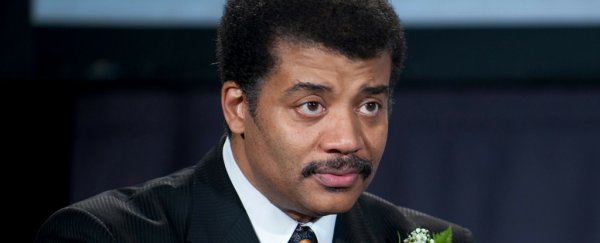President Trump's lead attorney Rudy Giuliani made headlines on Sunday when he appeared to argue that "truth isn't truth," and that facts are in the eye of the beholder.
The remarks went viral and immediately drew criticism from journalists and political commentators, who bemoaned the coming of the post-truth era.
Following the outrage, came two more voices of dissent from a field that doesn't often involve itself in politics but is very much concerned with the truth.
A day after the interview, astrophysicist and science communicator Neil DeGrasse Tyson tweeted, "I'm okay with a US Space Force. But what we need most is a Truth Force — one that defends against all enemies of accurate information, both foreign & domestic."
I’m okay with a US Space Force. But what we need most is a Truth Force — one that defends against all enemies of accurate information, both foreign & domestic.
— Neil deGrasse Tyson (@neiltyson) August 20, 2018
Several of Tyson's follower's immediately pointed out that putting "truth" in the hands of the government could have severe repercussions.
"Dr. Tyson, you want us to have a government branch dedicated to telling us what public information is accurate and what public information is not? With all due respect, sir, that seems like a very bad idea," ScienceHype countered.
Others argued that George Orwell has already explored this hypothetical to its tragic end.
"We should call it the Ministry of Tru- wait a second," jokes one user.
We should call it the Ministry of Tru- wait a second
— @ (@world_war_four) August 20, 2018
But Tyson had a counterargument ready to go. He reasoned that there are already independent agencies set up by the government to parse truth and fact from fiction.
The National Academy of Sciences, for instance, was established by Congress during the height of the civil war in 1863 as a private, non-governmental institution, which would advise the nation on issues related to science and technology.
"A good start: The National Academy of Sciences, which "…provides objective, science-based advice on critical issues affecting the nation."," Tyson replied.
A good start: The National Academy of Sciences, which “…provides objective, science-based advice on critical issues affecting the nation."
— Neil deGrasse Tyson (@neiltyson) August 20, 2018
While many continued to argue that there are too many risks associated with a Truth Force, others jumped on the idea.
"Right on, @neiltyson. As I have said: If we label the food that goes into our bodies, why don't we label the info that goes into our heads? We need a nonpartisan body that itself is checked by a nonpartisan body, assessing the accuracy of news outlets & rating them for accuracy," one user replied.
The conversation was so intriguing that the Science Guy himself even got involved.
Bill Nye retweeted Tyson's argument, adding: "The National Academy was established in midst of the US Civil War to provide scientific advice "whenever called upon." It was 72 years after Article 1, Sec. 8 of the Constitution cited "the Progress of Science." But our most important Truth Forces remain our press and news media."
The National Academy was established in midst of the US Civil War to provide scientific advice “whenever called upon.” It was 72 years after Article 1, Sec. 8 of the Constitution cited “the Progress of Science.” But our most important Truth Forces remain our press and news media.
— Bill Nye (@BillNye) August 20, 2018
Nye's tweet was followed by another, which argued that truth today is more at risk than it has ever been.
And that's not just the Science Guy's opinion (although in Giuliani's world, these are called facts, too). An analysis from the Washington Post earlier this year found that President Trump has made 4,229 false or misleading claims in 558 days.
We need science and truth now more than ever.
— Bill Nye (@BillNye) August 20, 2018
Science AF is ScienceAlert's new editorial section where we explore society's most complex problems using science, sanity and humor.
